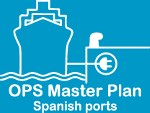26/06/2018
The use of the auxiliary engines by ships when at berth causes greenhouse gas emissions, air quality emissions and noise pollution in the port areas, which are often located in or near cities. Onshore Power Supply (OPS) is an option to provide electricity to the ships from the national grid and to reduce the unwanted environmental impact of ships at berths. In recent years, the interest in the use of OPS has strongly increased in the Flemish ports and inland waterways. One of the actions to encourage the expansion of onshore power facilities was the setup of the Flemish Shore Power Platform (www.binnenvaartservices.be) which coordinates all actions related to the use, implementation and expansion of this environmentally friendly technology for inland navigation in Flanders.
Data on electricity consumption by a specific ship from two European projects (TEN-T project “Shore Power in Flanders” and CLean INland SHipping project) has been used to quantify the benefit of reducing the emissions of NOx, SO2, PM and CO2 that would occur by using onshore power supply. Emissions through the use of auxiliary engines (diesel-related emissions), Emissions through the use of OPS (electricity-related emissions), and Net reduced emissions through the introduction of OPS have been calculated. The results demonstrated that OPS can significantly reduce diesel-related emissions from ships at berth. Through the introduction of OPS the emissions of NOX can be reduced by about 93%. The emissions of PM10 can be reduced by 99% and the emissions of SO2 by more than 96%. The emissions of CO2 can be reduced by more than 90%. The reduced emission of C02 in this study is high compared to other studies, this is due to the low CO2 emission factor for electricity production in Belgium that we applied in our calculations.
In 2016, the use of OPS at only two locations has generated a total societal benefit of € 53,814. The overall use of OPS for only inland navigation in 2016 in the port of Antwerp was 766 MWh, represents a societal benefit of € 108,381. We conclude from our analysis of the evidence that providing an onshore power supply for vessels at berth can result in significant environmental and societal gains. A communication strategy should be put in place, focusing on adequately informing and thereby stimulating the use of onshore power supply. The results of this paper can be used as basis information to convince the ship-owners of the environmental and societal benefits of OPS. River cruisers have higher power and electricity demand providing a better business case for OPS for inland navigation and a better prospect for market development. Policy makers could produce more net societal gain by implementing incentives and mandates to encourage more shift toward OPS.
Paper abstract is signed by Mohssine El Kahloun (1), Pieter Vandermeeren (2), Ilse Hoet (1), Merleen Coenen (1); (1) Flemish Ministry of Mobility and Public Works, Brussels, Belgium (2) Antwerp Port Authority, Antwerp, Belgium (visit PIANC website at http://pianc.info/proceedings for more info).



